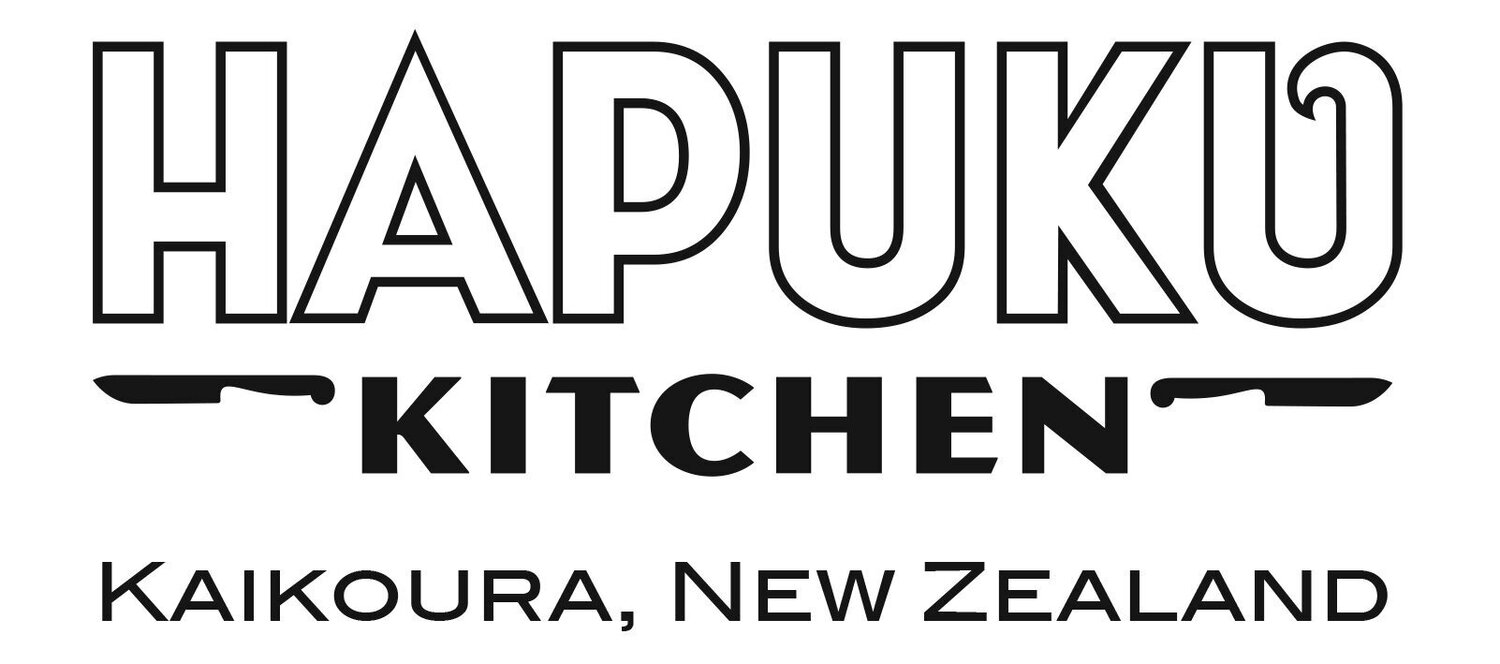Hapuku Kitchen: Tapping into the rich, food story of Kaikōura
Writer: Meriana Johnsen for stuff.co.nz
Nestled by the sea and wrapped in mountains, the geography of Kaikōura creates a food bowl.
From wild pigs and deer in the bush; to the rich, fertile soils of the flat lands perfect for growing and farming; to the ocean abound with kaimoana, there’s plenty of good food in this small coastal town.
Food is part of the whakapapa of Kaikōura: the name itself refers to eating (kai) crayfish (kōura), which thrive off the coast.
According to the local hapū of Ngāi Tahu, Kāti Kurī, it was an early Māori explorer, Tama ki te Rangi, who named the area Te Ahi Kaikōura a Tama ki te Rangi after he enjoyed a meal of kōura cooked over an open fire.
This rich “food story” was what made Kaikōura the ideal spot for Fiona Read and Chris Sturgeon to start Hapuku Kitchen. Growing up in Karitāne with his Ngāi Tahu whānau, Chris has a strong connection to kaimoana: he spent his childhood catching flounder or diving for pāua. And it was a lingering childhood memory of Kaikōura that made Fiona want to build a life and business here.
“I remember coming here as a child about 10 or 11, we did the whole South Island road trip – canvas tent on the back and three kids jammed in the back of a Cortina – and I still remember arriving in Kaikōura and walking through Memorial Gardens with the whalebone arches...and it always stuck in my mind. It just kept drawing me back”.
Those whalebone arches became the logo for Hapuku Kitchen, embossed on a large old frying pan on the front gate. Turning off SH1, just north of the Kaikōura township down Parson’s Road, Hapuku Kitchen is the first property on your left. The couple purchased the five hectares of land 14 years ago, and have slowly renovated the rundown homestead, planting gardens and bringing in livestock.
They now have nine cows (a mixture of Scottish breeds: Highlander, White Gallaway and Belted Gallaway), some chickens, ducks and nine Saddleback pigs: all carefully selected for easy-care and taste. Then there’s plenty of pāua and kōura around to add to the menu, although fresh fish is harder to get – most is sold in bulk to commercial fisheries.
From what’s on offer, Fiona designs a unique menu for each culinary experience. The former Masterchef New Zealand finalist enjoys experimenting, with her cooking ethos “rustic, honest food packed full of flavour and texture”.
We were lucky enough to be the guinea pigs for her latest creation: flatbread made with a rewana kūmara starter, pork lard from the property and wild fennel seeds.
We began our culinary experience with a kōrero from Fiona and Chris about what to expect, over a refreshing beverage made with lemonwood (tarata) rhubarb shrub and lemon verbena.
For a half-day experience, you will spend up to an hour foraging in the organic garden. Fiona explains the many plant varieties, encouraging you to sample different herbs (like the spicy pop of fresh coriander seeds) and flowers as you weave through. For a full-day experience, you’ll also have the opportunity to plant something.
With baskets full of lemons, yellow courgettes, kawakawa, mint, rosemary and parsley, to name a few, we made our way to the kitchen. We set about preparing the pāua, receiving tips from Fiona on how best to hold the knife, and getting our hands dirty rolling the flatbreads out in pork lard. Fiona’s experience in the kitchen comes through, with her trusty sous chef Chris, making it a very relaxing process.
Once the flatbreads had crisped up, the salad tossed and the pāua ready, we followed Fiona’s plating style: loose, flowing, like “it’s fallen from the tree”. Then, the aprons were off, and it was time to enjoy the meal. It’s easy enough for hours to pass in the company of Chris and Fiona. Long after the plates were clean, and the wine glasses empty, we were still talking.
In creating Hapuku Kitchen, Chris said they wanted tourists to come and make “genuine connections” over good food, like they had experienced at Supper Clubs during their travels overseas.
The kōrero at the dinner table really made the experience: it felt like we were hanging out with old friends, swapping stories and getting the local goss.
Whale watching and other water tourism activities have for so long dominated Kaikōura. Fiona and Chris saw an opportunity to bring tourists a new experience; one that tells the story of the mountains, land and sea through food. Hapuku Kitchen does just that.
Drink: Lemonwood (tarata), lemon verbena, rhubarb, cider vinegar, orange and lemon juice
Meal: Paua slow-cooked in lemon juice, garlic and olive oil finished over hot coals with a salad of zucchini and fresh herbs from the garden, and flatbread made with a rewena kumara starter, pork lard from the property and wild fennel seeds.
Tea (to finish): Kawakawa and mint
The Hapuku Kitchen Seasonal Feast - half day cooking class from $220 pp. Full day experience from $295 pp. For more details head to hapukukitchen.co.nz
The writer was a guest of Hapuku Kitchen.
